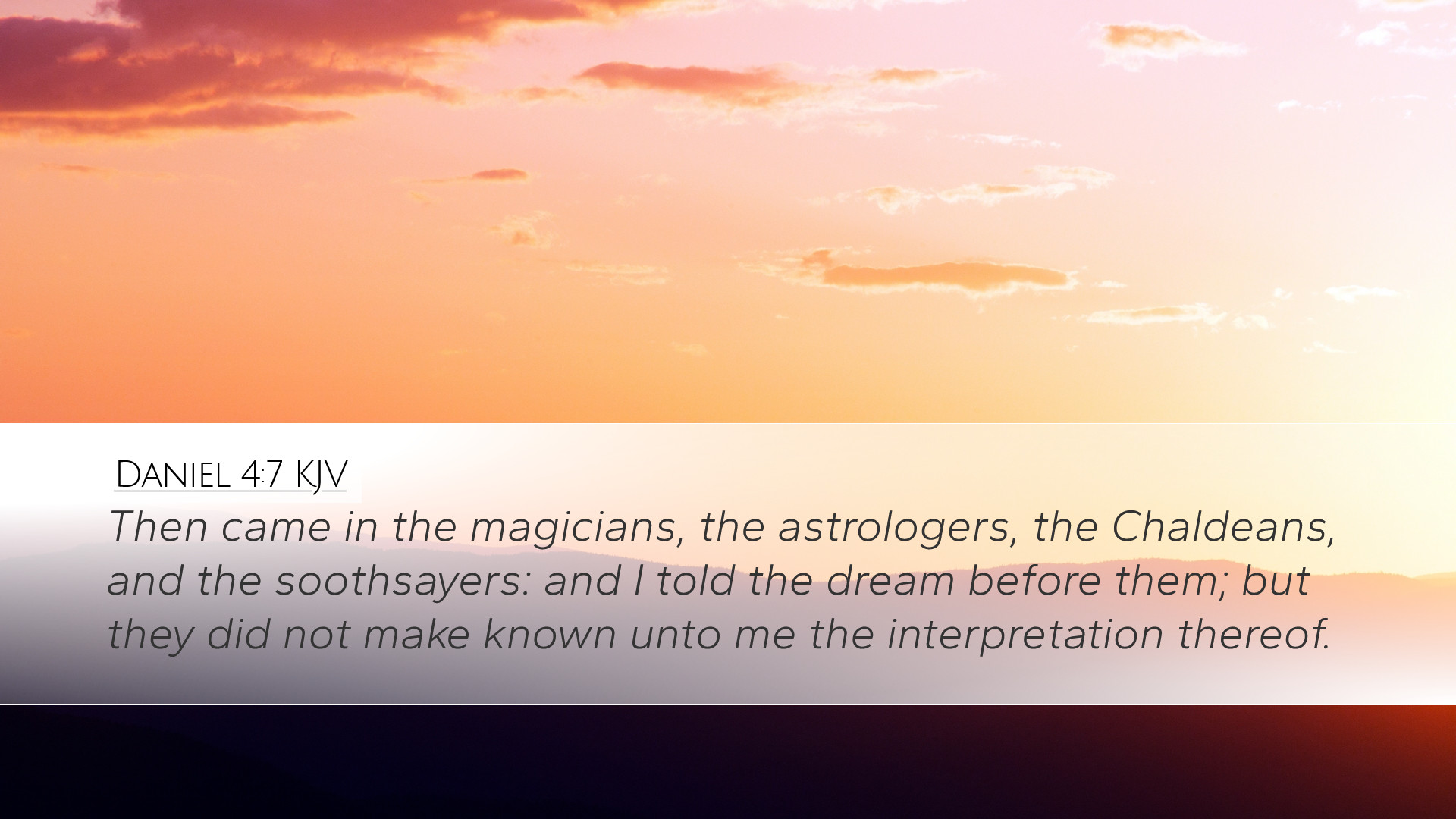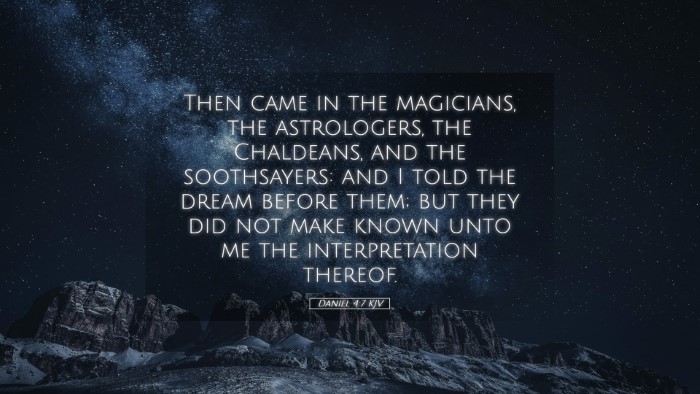Commentary on Daniel 4:7
Daniel 4:7 reads: "Then came in the magicians, the astrologers, the Chaldeans, and the soothsayers; and I told the dream before them; but they did not make known unto me the interpretation thereof."
This verse highlights King Nebuchadnezzar’s reliance on his wise men, encapsulating a moment of desperation that illustrates the limits of human wisdom. As we examine this verse through the insights of esteemed commentators such as Matthew Henry, Albert Barnes, and Adam Clarke, we delve deep into the theological and practical implications for believers and leaders alike.
Contextual Overview
The context of this chapter sets a dramatic stage within the narrative of Daniel. Nebuchadnezzar is troubled by a dream, indicating divine communication. This chapter serves not only as a historical account but also as a personal testimony of the king’s transformation following this divine encounter. The choice to summon the wise men underscores the broader theme of seeking wisdom and understanding beyond oneself.
Insights from Matthew Henry
Matthew Henry illustrates that Nebuchadnezzar's dream symbolizes the futility of human wisdom when disconnected from divine insight. The king’s reliance on magicians and astrologers reflects a common tendency among leaders to seek counsel from sources that do not align with God’s truth.
-
Human Limitations: Henry emphasizes that the failure of the wise men to interpret the dream signifies the inherent limitations of human reasoning in the face of divine mysteries.
-
Desperation for Answers: The king’s need for understanding points to a deeper existential quest that transcends mere information; it embodies a yearning for insights that can provide direction and peace.
-
Calling on the Right Source: Ultimately, Henry notes, the transformative wisdom Daniel possesses originates from a relationship with God, showcasing that true understanding is reserved for those who seek God’s guidance over worldly insights.
Insights from Albert Barnes
Albert Barnes provides a meticulous examination of the characters involved in this verse. He notes the various roles of the wise men called upon by Nebuchadnezzar.
-
Roles of the Magicians and Astrologers: Barnes breaks down the groups called upon—magicians (practitioners of sorcery), astrologers (astrologers who studied the stars), Chaldeans (noted for their wisdom), and soothsayers (interpreters of omens). This highlights the diverse yet ultimately ineffective options the king turns to.
-
Their Inability: Barnes points out that their inability to interpret the dream illustrates a divine purpose: God often reveals truths only to those attuned to His voice, reinforcing the idea that human insight can falter while divine revelation prevails.
-
The King's Reluctance: The fact that the king shared his dream but received no interpretation showcases both his authority and the disgrace of his wise men. Barnes infers that no amount of human wisdom can unlock the secrets of God, calling readers to reflect on where they seek wisdom in their own lives.
Insights from Adam Clarke
Adam Clarke approaches this passage with pastoral sensitivity, emphasizing the theological implications of Nebuchadnezzar's plight.
-
Theological Reflection: Clarke emphasizes the sovereignty of God even over the greatest powers of the earth, as shown by the futility of idolatrous wisdom in interpreting the king's divine dream.
-
God's Sovereign Control: He highlights that God's control and intervention are paramount, often choosing to reveal His will through unexpected channels. The wise men’s failure signals a divine orchestration that will lead to Daniel’s exaltation as God’s chosen interpreter.
-
Call to Prayer and Discernment: Clarke encourages readers to be discerning in their own counsel, urging leaders to seek divine insight through prayer and reliance on God rather than merely deferring to human wisdom.
The Broader Implications for Today
This verse serves as a profound reminder for pastors, students, theologians, and all believers about the necessity of divine wisdom. The quest for understanding can be fraught with distractions and false guides.
-
Challenge of Secular Wisdom: Like Nebuchadnezzar, modern leaders often seek counsel from voices that may not reflect God's will. This calls for vigilance and discernment in who we listen to and how we process wisdom in a complex world.
-
Importance of Relationship with God: The critical aspect of Daniel’s character is his relationship with God, underscoring that true understanding comes from a heart aligned with God's purposes. This is essential for effective ministry and leadership.
-
Seeking Divine Revelation: As believers, there is encouragement here to continually seek God in our decisions and challenges, praying for His revelation rather than relying solely on human intellect or tradition.
Conclusion
The narrative encapsulated in Daniel 4:7 provides a rich tapestry of insights for contemporary readers. The intersection of human limitations and divine capacity is pivotal to understanding our role as stewards of God's truth. Thus, it becomes imperative for all who engage with scripture—pastors, students, and scholars—to embrace the teachings from such passages, recognizing that true wisdom begins with the fear of the Lord (Proverbs 9:10) and a deep commitment to understand His ways.


